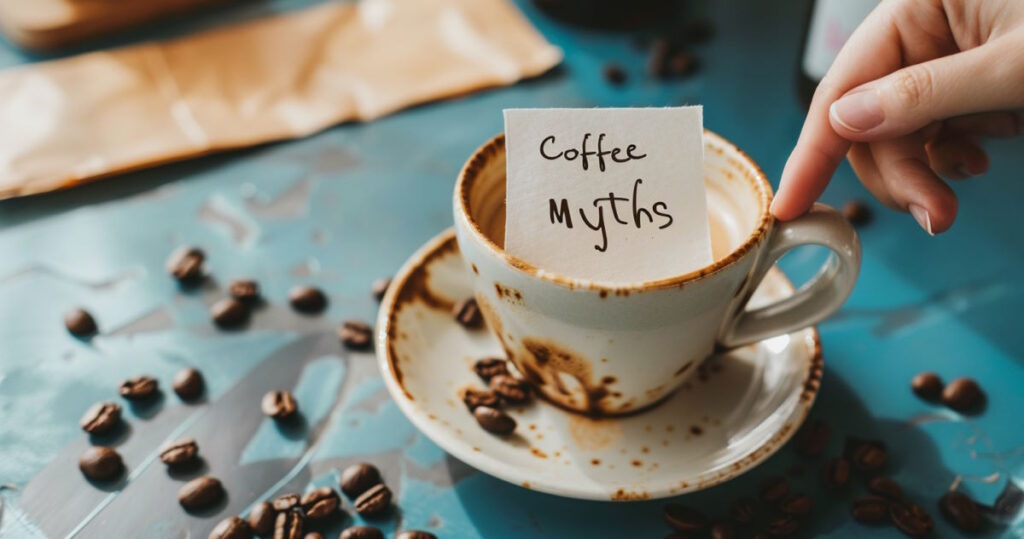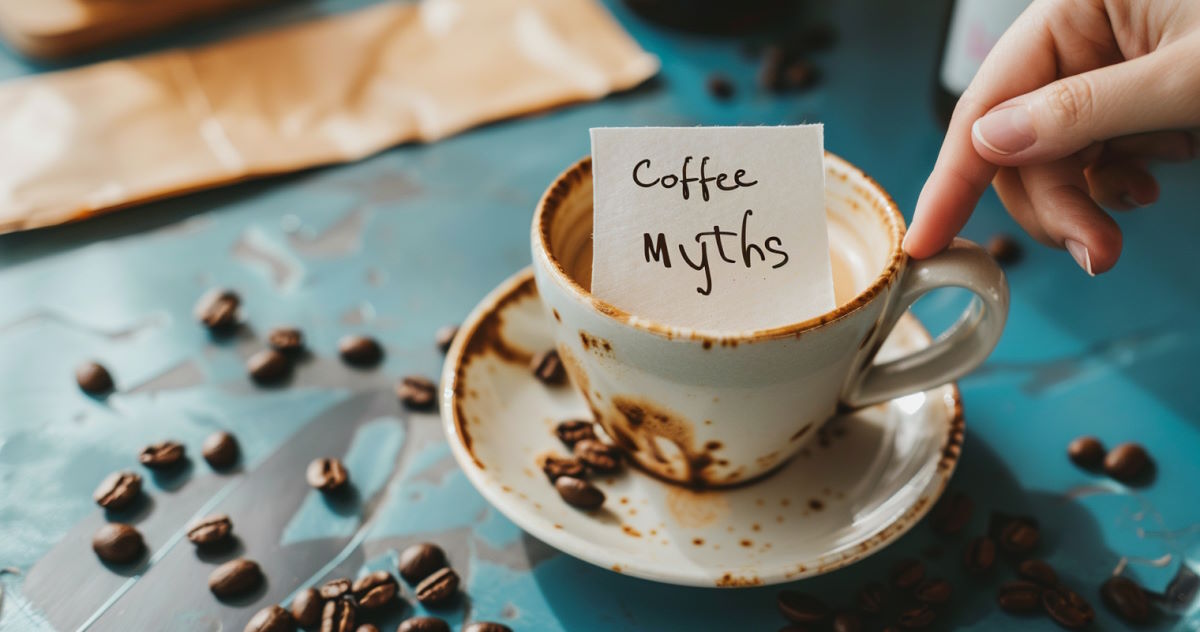
Picture this: you’re at your favourite coffee shop waiting for your morning coffee. The person ahead of you orders something so detailed that it sounds like a magic spell. You roll your eyes and think, “Does this actually matter?” If this scene feels familiar, you’re not alone.
For some reason, coffee has sparked an endless list of myths that leave even the most seasoned drinkers scratching their heads. Let’s dive into the truth behind these common misconceptions and save ourselves (and our baristas) from unnecessary eye rolls.
Espresso Has More Caffeine Than Regular Coffee
Many assume that espresso is the heavyweight champ of caffeine. But here’s the kicker: while espresso does pack a punch in a small package, your standard cup of filter coffee contains more caffeine. Sure, espresso is intense, but it’s the little cup that could – not the most caffeine-loaded choice on the menu.
Baristas everywhere would like you to know that if you’re after a real caffeine hit, a large Americano or filter coffee is where it’s at. Espresso might have the bold flavour, but when it comes to caffeine content, size really does matter.
You Can Judge Coffee Quality by Its Price
The idea that the most expensive coffee must be the best is as flawed as the weather forecast in Britain. Price doesn’t always equate to quality. Some of the best brews can be found in the unlikeliest of places, including your local café with the £2.50 flat white.
Next time you’re eyeing up the coffee beans, don’t be swayed by the price tag alone. Go for flavour, freshness, and – if you’re feeling fancy – the origin. Your taste buds will thank you, and your wallet won’t groan.
Dark Roasts Are Stronger Than Light Roasts
It’s easy to assume that dark, brooding coffee beans mean a stronger coffee. After all, it looks more intense, right? Actually, the opposite is true. The darker the roast, the more flavour gets roasted out of the bean, including some of that precious caffeine.
If you’re looking for a strong coffee experience, opt for a lighter roast. Not only does it pack more caffeine, but you’ll also taste more of the bean’s natural flavours – like a nice fruity or floral note – without the bitterness.
Adding Sugar Ruins Your Coffee
We get it: sugar in coffee can be a touchy subject, like dunking your biscuit in tea for just a bit too long. But hear us out. Adding sugar isn’t some unforgivable sin. In fact, many baristas will tell you that a tiny bit of sweetness can actually enhance certain flavours in your brew.
It’s all about balance. So if you need a bit of sugar to get through your cup, go ahead – no judgment here. It’s your coffee, after all, not a Michelin-starred dessert.
You Should Store Coffee Beans in the Fridge
This myth needs to go out the window, faster than a British summer. Storing coffee in the fridge may seem like a good idea, but it actually does more harm than good. The fridge introduces moisture, and moisture is the enemy of fresh coffee.
Instead, keep your coffee beans in a cool, dry place – think pantry, not next to the milk. This way, they’ll stay fresher for longer, and your morning brew will taste better than ever.
Coffee Dehydrates You
We’ve all heard it before: “Don’t drink too much coffee, it’ll dehydrate you!” While coffee does have a mild diuretic effect, it’s not enough to turn you into a shriveled raisin by midday. In fact, that cup of joe still counts towards your daily fluid intake.
So, no need to chase every cup of coffee with a gallon of water – unless you’re trying to reach your hydration goals. Moderation is key, as always, but you can sip without fear of drying out.
Decaf Means No Caffeine
A common misconception that baristas deal with on the daily: decaf doesn’t mean “no caffeine.” It just means “less caffeine.” Depending on how it’s brewed, a decaf coffee can still contain a small amount of the stuff. It won’t give you the jitters, but if you’re going caffeine-free, you might still want to watch how many decafs you’re downing.
The next time you’re up late wondering why you can’t sleep after that “decaf” cappuccino, now you know.
The Finer the Grind, the Stronger the Coffee
Grind size matters, but it’s not as simple as “fine = strong.” The grind size affects extraction, meaning how much of the coffee’s flavour gets pulled into your cup. A finer grind will extract faster, giving you more flavour, but it won’t necessarily make the coffee stronger.
If you’re after more caffeine or intensity, it’s more about brewing time, water temperature, and the coffee-to-water ratio. Not everything is about the grind – no matter what your gym-obsessed mate says.
Milk Kills the Flavour of Coffee
Adding milk isn’t an insult to coffee’s rich, complex flavours. Many baristas craft drinks to balance both the milk and the coffee, making sure they complement each other. Think of it like a partnership, rather than milk steamrolling the coffee into submission.
So, if you’re the type who enjoys a splash of milk in your brew, don’t let the purists put you off. Your flat white can still be a flavour powerhouse.
Instant Coffee is Horrible
Okay, this one is divisive, but hear me out. Instant coffee has come a long way from the gritty stuff your grandparents used to drink. While it may not hold up to your favorite café’s brew, some quality instant coffees can save you when you’re in a pinch (or camping in the wilds of Wales).
It’s not going to replace your fresh ground beans, but it’s certainly not the disaster it’s been painted as. Sometimes convenience does taste pretty good.
All Coffee Is Bitter
Not all coffee tastes like it’s been left out to burn under the sun. The bitterness largely depends on how the beans are roasted and brewed. A good light or medium roast can have sweet, fruity, or floral flavours, making you wonder why anyone drinks coffee that tastes like coal.
So if you’re used to that bitter brew, it might be time to try a lighter roast or experiment with different brewing methods. You’ll thank us later.
You Shouldn’t Drink Coffee in the Afternoon
You don’t need to swear off coffee just because it’s 2 PM. Some people are more sensitive to caffeine and need to stop early, but others can enjoy coffee in the evening without trouble sleeping.
Know your body, but don’t feel pressured to give up your afternoon flat white just because of the clock. Life’s too short for arbitrary rules.
Espresso is a Coffee Bean Type
Espresso is not a type of bean but a method of brewing. Any coffee bean can be used to make espresso, whether it’s a dark roast, light roast, or somewhere in between. It’s all about how the coffee is brewed, not what kind of bean it is.
So, next time someone says they only drink “espresso beans,” you can give them a knowing smile – and maybe recommend this article.
More Grounds Equals Better Coffee
More coffee doesn’t always mean better coffee. Overloading your filter with grounds can lead to over-extraction, making your coffee taste bitter and unbalanced. Sometimes, less is more – think quality over quantity.
A good rule of thumb: stick to the recommended coffee-to-water ratio for a balanced, delicious cup.
Conclusion
Now that you know the truth behind these coffee myths, why not share this with your friends and see who’s been guilty of believing them? And of course, let us know on our Facebook page – what’s the biggest coffee myth you used to believe? Let’s keep the coffee conversation brewing!

